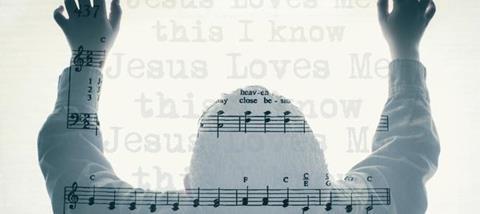
Encounters with God transform people.
The songs, prayers and activities of gathered worship can create space for God to move powerfully in our churches. This might occur in quiet, traditional services. Or it might happen in swinging-from-the-projection-screen charismatic celebrations. God is gracious to meet us in all kinds of styles.
God desires that we encounter him, catch his heart for this broken world, and are sent out to play our part in his plans for redeeming all of creation.
All of this is possible - but do our songs and hymns really facilitate it?
We often settle for an hour or so of escaping from the harsh realities of the world, rather than engaging with it. If you look at the lyrics of our most popular songs and hymns, you might quickly conclude that God is not interested in our lives outside of church.
When did you last sing a song which mentioned the specifics of how we live in the world?
The Bible (and its songbook, the Psalms) has lots to say about things like work, money, ethics, life in society. In contrast, our songs today are strangely silent on these issues. Or they use a funny biblical-sounding code language: we sing of “silver and gold” instead of money, or we hint at our problems evasively using terms such as “storms”, or “darkness”. And as soon as we mention a concrete aspect of contemporary life (skyscrapers and submarines spring to mind) we will label that a “kid’s song”; far too “unspiritual” for a mature adult audience.
Spiritual vs. Unspiritual?
This is an illustration of a much deeper problem, the issue of dualism where certain things are seen as “spiritual” (singing songs in church, praying, heaven); while other things are “unspiritual” (work, normal life, physical things).
Many of our songs imply that we only meet God when we gather and sing: “Come, now is the time to worship…”, “Here I am to worship…” “Your presence in this place”.
We sing with the hope that the the “things of earth become strangely dim”, and the world outside of church is often portrayed in our songs as a dark, hostile place.
Worshipping engages our whole lives from LICC on Vimeo.
Looking at the lyrics for the top 25 worship songs in the UK and USA there is virtually no language of expectation that the believer will worship, serve or experience God in the world outside the church.
In contrast, the Bible claims that God created the heavens and the earth (Genesis 1:1), the visible and invisible (Colossians 3:16), and that Jesus is in the process of redeeming all things (Colossians 3:20). The cross, the resurrection and the ultimate purpose of God is to renew and reconcile every aspect of his creation (Ephesians 1 & 2).
If we, the Church, are going to play our part in this wonderful plan we need lyrics which remind us of God’s heart for the whole world and the whole of life. We need songs and times of gathered worship that create space for God to inspire us, empower us and send us out.
Lyrics and Whole Life
Songs and hymns of this kind are being written: the challenge is for us to choose them and make them part of our regular worshipping diet.
So for example, Geraldine Latty’s 'Lord you hear the cry' is an excellent example of a song which calls out to God for very specific, everyday problems: “The child ill-treated… the depressed one sinking… the addict craving… the greed of nations.” It does not wallow in troubles but confidently expresses God’s concern for all these situations, and our future hope of “resurrection day for creation groaning”.
Or if you want your congregation to commit to serving God in very everyday circumstances, take a look at Stuart Townend and Simon Brading’s 'Christ be in my waking'. Stuart has written that this song “is a reminder to be ‘God aware’ in all the different parts of our lives - from morning to evening and night, in my thought-life, in the things I say… and in our most desperate moments.”
A modern hymn lyric (set to the tune 'Abide with me') which commits the congregation to engaging with every level of society is 'We seek your Kingdom' by Noel Robinson, Andy Flannagan and Graham Hunter. It asks for God’s forgiveness where we have not lived for him, and calls out to God to “transform, revive and heal society”.
We wanted a song that expressed the whole-life and whole-creation implications of Jesus’ resurrection, so wrote 'Christ was raised'. It draws out the scope of salvation for the individual, for our relationships with other individuals and people-groups, and for the whole of creation.
If you want to explore these themes further and get more song and hymn suggestions, see our book Whole Life Worship (IVP) and the accompanying Journey Pack. We are also running Saturday training days to launch this material - visit engageworship.org for more information.
Sam and Sara Hargreaves run Engage Worship, providing training and resources for local church worship. They both studied at London School of Theology, where Sam is a guest lecturer. They live in Luton where they volunteer at their local Baptist church.
Click here to request a free copy of Premier Christianity magazine




























